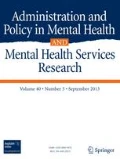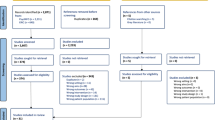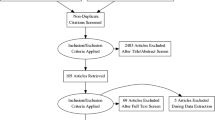Abstract
This study examined the effectiveness of an educational approach to psychiatric rehabilitation called the Recovery Center. Using a quasi-experimental design we recruited 97 intervention and 81 comparison participants and examined the intervention’s impact on health, mental health, subjective, and role functioning outcomes. Results suggested that this intervention was effective in improving subjective outcomes, especially empowerment and recovery attitudes, both of which received primary emphasis in the intervention. The Recovery Center, which integrates a bio-psychosocial framework with psycho-educational interventions shows promise as a complement to traditional mental health services in developing readiness for rehabilitation and promoting recovery among individuals with severe psychiatric disabilities.
Similar content being viewed by others
References
Anthony, W. A., Cohen, M. R., Farkas, M. D., & Gagne, C. (2002). Psychiatric Rehabilitation (2nd ed.). Boston, MA: Boston University, Center for Psychiatric Rehabilitation.
Arns, P. G., & Linney, J. A. (1995). Relating functional skills of severely mentally ill clients to subjective and societal benefits. Psychiatric Services (Washington, D.C.), 46, 260–265.
Arns, P., Rogers, E. S., Cook, J., Mowbray, C., & Members of IAPSRS Research Committee. (2001). The IAPSRS toolkit: Its usefulness to PSR programs and its comparison with other performance measurement systems. Psychiatric Rehabilitation Journal, 45(1), 43–52.
Bond, G. R., Salyers, M. P., Rollins, A. L., Rapp, C. A., & Zipple, A. M. (2004). How evidence-based practices contribute to community integration. Community Mental Health Journal, 40(6), 569–588. doi:10.1007/s10597-004-6130-8.
Borkin, J., Steffen, J., Ensfield, L., Krzton, K., Wishnick, H., & Yangarber, N. (2000). Recovery attitudes questionnaire: Development and evaluation. Columbus, OH: Ohio Department of Mental Health.
Brophy, C. J., Norvell, N. K., & Kiluk, D. J. (1988). An examination of the factor structure and convergent and discriminant validity of the SCL-90R in an outpatient clinic population. Journal of Personality Assessment, 52(2), 334–340. doi:10.1207/s15327752jpa5202_14.
Brown, P., & Tucker, W. M. (2005). Overstating the case for recovery? Psychiatric Services (Washington, D.C.), 56, 1022–1023. doi:10.1176/appi.ps.56.8.1022-a.
Brown, C., Goetz, J., Van Sciver, A., Sullivan, D., & Hamena, E. (2006). A psychiatric rehabilitation approach to weight loss. Psychiatric Rehabilitation Journal, 29(4), 267–273. doi:10.2975/29.2006.267.273.
Campbell, D., & Stanley, J. (1963). Experimental and quasi-experimental designs for research. Chicago: Rand-McNally.
Cohen, M., Forbess, R., & Farkas, M. (2000). Rehabilitation readiness training technology: Developing readiness for rehabilitation (trainer package). Boston University, Center for Psychiatric Rehabilitation: Boston.
Cook, J. A., Leff, H. S., Blyler, C. R., Gold, P. B., Goldberg, R. W., Mueser, K. T., et al. (2005). Results of a multisite randomized trial of supported employment interventions for individuals with severe mental illness. Archives of General Psychiatry, 62, 505–512. doi:10.1001/archpsyc.62.5.505.
Copeland, M.E. (2002). Developing a recovery and wellness lifestyle: A self-help guide [Electronic Version]. Retrieved January 15, 2005 from www.mentalhealth.samsha.gov/publications/allpubs/goverment/default/asp/.
Coodin, S., Staley, D., Cortens, B., Desrochers, R., & McLandress, S. (2004). Patient factors associated with missed appointments in persons with schizophrenia. Canadian Journal of Psychiatry, 49(2), 145–148.
Cross, K. P. (1981). Adults as learners. San Francisco: Jossey-Bass.
Crowther, R. E., Marshall, M., Bond, G. R., & Huxley, P. (2001). Helping people with severe mental illness to obtain work: Systematic review. British Medical Journal, 322(7280), 204–208. doi:10.1136/bmj.322.7280.204.
D’Agostino, R. B. J. (1998). Propensity score methods for bias reduction for the comparison of a treatment to a non-randomized control group. Statistics in Medicine, 17, 2265–2281. doi :10.1002/(SICI)1097-0258(19981015)17:19<2265::AID-SIM918>3.0.CO;2-B.
Davidson, L., O’Connell, M., Tondora, J., Styron, T., & Kangas, K. (2006). The top ten concerns about recovery encountered in mental health system transformation. Psychiatric Services (Washington, D.C.), 57(5), 640–645. doi:10.1176/appi.ps.57.5.640.
Derogatis, L. R. (1994). Symptom checklist 90 revised (SCL-90-R).
Eisen, S. V., Dill, D. L., & Grob, M. C. (1994). Reliability and validity of a brief patient report instrument for psychiatric outcome education. Hospital & Community Psychiatry, 45(3), 242–247.
Ensfield, L. B. (1998). The personal vision of recovery questionnaire. US: Cincinnati.
Ensfield, L., Steffen, J., & Borkin, J. (Eds.). (1999). Personal vision of recovery questionnaire: The development of a consumer-driven scale. Columbus, OH: Ohio Department of Mental Health.
Fitts W. H., & Warren W. L. (1996). Tennessee Self-Concept Scale (2nd ed.). Western Psychological Services.
Glanz, K., Rimer, B. K., & Lewis, F. M. (2002). Health behavior and health education. Theory, research and practice. San Francisco: Wiley.
Hutchinson, D. S., Anthony, W. A., Ashcroft, L., Johnson, E., Dunn, E., Lyass, A., et al. (2006a). The personal and vocational impact of training and employing people with psychiatric disabilities as providers. Psychiatric Rehabilitation Journal, 29(3), 205–214. doi:10.2975/29.2006.205.213.
Hutchinson, D. S., Gagne, C., Bowers, A., Russinova, Z., Skrinar, G. S., & Anthony, W. A. (2006b). A framework for health promotion services for people with psychiatric disabilities. Psychiatric Rehabilitation Journal, 29(4), 241–250. doi:10.2975/29.2006.241.250.
Lehman, A. F., Postrado, L. T., Roth, D., McNary, S. W., et al. (1994). Continuity of care and client outcomes in the Robert Wood Jonhson foundation program on chronic mental illness. The Milbank Quarterly, 72(1), 105–122. doi:10.2307/3350340.
Liberman, R. P., Kopelowicz, A., Ventura, J., & Gutkind, D. (2002). Operational criteria and factors related to recovery from schizophrenia. International Review of Psychiatry (Abingdon, England), 14, 256–272. doi:10.1080/0954026021000016905.
McFarlane, W. R. (1997). Integrating family psychoeducation and assertive community treatment. Administration and Policy in Mental Health and Mental Health Services Research, 25(2), 191–198. doi:10.1023/A:1022291022270.
McHorney, C. A., Ware, J., & Raczek, A. (1993). The MOS 36-Item Short-Form Health Survey (SF-36): II. (1993). Psychometric and clinical tests of validity in measuring physical and mental health constructs. Medical Care, 31(3), 247–263. doi:10.1097/00005650-199303000-00006.
McHorney, C. A., Ware, J., Lu, J., & Sherbourne, C. (1994). The MOS 36-item short-form health survey (SF-36): III. Tests of data quality, scaling assumptions, and reliability across diverse patient groups. Medical care. Medical Care, 32(1), 40–66. doi:10.1097/00005650-199401000-00004.
Mead, S., & Copeland, M. E. (2000). What recovery means to us: Consumers’ perspectives. Community Mental Health Journal, 36(3), 315–328. doi:10.1023/A:1001917516869.
Mead, S., & Copeland, M. E. (2005). What recovery means to us. In L. Davidson, C. Harding & L. Spaniol (Eds.), Consumer perspectives in recovery from severe mental illnesses: Research evidence and implications for practice (Vol. 1, pp. 69–81). Boston, MA: Center for Psychiatric Rehabilitation, Boston University.
Meta Services Inc. (2002). Wellness and empowerment in life and living. Phoenix, AZ: Meta Services, Inc.
Mueser, K., Bond, G., Drake, R., & Resnick, S. (1998). Models of community care for severe mental illness: A review of research on case management. Schizophrenia Bulletin, 24(1), 37–74.
Mueser, K. T., Corrigan, P. W., Hilton, D. W., Tanzman, B., Schaub, A., Gingerich, S., et al. (2002). Illness management and recovery: A review of the research. Psychiatric Services (Washington, D.C.), 53(10), 1272–1284. doi:10.1176/appi.ps.53.10.1272.
Mueser, K. T., Salyers, M. P., & Mueser, P. R. (2001). A prospective analysis of work in schizophrenia. Schizophrenia Bulletin, 27(2), 281–296.
Mueser, K. T., Torrey, W. C., Lynde, D., Singer, P., & Drake, R. E. (2003). Implementing evidence-based practices for people with severe mental illness. Behavior Modification, 27(3), 387–411. doi:10.1177/0145445503027003007.
National Cancer Institute. (2005). Theory at a glance: A guide for health promotion practice. US Department of Health and Human Services. National Institutes of Health.
New Freedom Commission on Mental Health. (2003). Achieving the promise: Transforming mental health care in America. Final report (No. SMA-03-3832). Rockville, MD: DHHS.
Noordsy, D., Torrey, W., Mueser, K., Mead, S., O’Keefe, C., & Fox, L. (2002). Recovery from severe mental illness: an intrapersonal and functional outcome definition. International Review of Psychiatry (Abingdon, England), 14(4), 318–326. doi:10.1080/0954026021000016969.
Nose, M., Barbui, C., & Tansella, M. (2003). How often do patients with psychosis fail to adhere to treatment programmes? A systematic review. Psychological Medicine, 33, 1149–1160. doi:10.1017/S0033291703008328.
O’Donnell, M. P. (1989). Definition of health promotion part III: Expanding the definition. American Journal of Health Promotion, 3(3), 5.
Onken, S., Craig, C., Ridgeway, P., Ralph, R., & Cook, J. (2007). An analysis of the definitions and elements of recovery: A review of the literature. Psychiatric Rehabilitation Journal, 31, 9–22. doi:10.2975/31.1.2007.9.22.
Prochaska, J. O., Diclemente, C. C., & Norcross, J. C. (1992). In search of how people change—Applications to addictive behaviors. The American Psychologist, 47(9), 1102–1114. doi:10.1037/0003-066X.47.9.1102.
Ray, O. (2004). How the mind hurts and heals the body. The American Psychologist, 59(1), 29–40. doi:10.1037/0003-066X.59.1.29.
Resnick, S. G., Rosenheck, R. A., & Lehman, A. F. (2004). An exploratory analysis of correlates of recovery. Psychiatric Services (Washington, D.C.), 55(5), 540–547. doi:10.1176/appi.ps.55.5.540.
Ridgeway, P., McDiarmid, D., Davidson, L., & Bayes, J. (2002). Pathways to recovery: A strengths recovery self-help workbook. Lawrence, KS: University of Kansas, School of Social Welfare, Office of Mental Health Research & Training.
Rogers, E. S., Chamberlin, J., Ellison, M. L., & Crean, T. (1997). A consumer-constructed scale to measure empowerment among users of mental health services. Psychiatric Services (Washington, D.C.), 48(8), 1042–1047.
Rogers, E. S., Teague, G., Lichtenstein, C., Campbell, J., Lyass, A., Chen, R., et al. (2007). The effects of participation in adjunctive consumer-operated programs on both personal and organizationally mediated empowerment: Results of a multi-site study. Journal of Rehabilitation Research and Development, 44(6), 785–800. doi:10.1682/JRRD.2006.10.0125.
Salyers, M., Becker, D., Drake, R., Torrey, W., & Wyzik, P. (2004). A ten-year follow-up of a supported employment program. Psychiatric Services, 55, 302–308.
Schmitz, N., Kruse, J., Heckrath, C., Alberti, L., & Tress, W. (1999). Diagnosing mental disorders in primary care: The General Health Questionnaire (GHQ) and the Symptom Check List (SCL-90-R) as screening instruments. Social Psychiatry and Psychiatric Epidemiology, 34, 360–366. doi:10.1007/s001270050156.
Schmitz, N., Hartkamp, N., & Franke, G. H. (2000). Assessing clinically significant change: Application to the SCL-90-R. Psychological Reports, 86, 263–274. doi:10.2466/PR0.86.1.263-274.
Sederer, L. I., & Dickey, B. (Eds.). (1996). Outcomes Assessment in clinical practice. Baltimore, MD: Williams & Wilkins.
Shern, D. L., Tsemberis, S., Anthony, W. A., Lovell, A. M., Richmond, L., Felton, C. J., et al. (2000). Serving street-dwelling individuals with psychiatric disabilities: Outcomes of a psychiatric rehabilitation clinical trial. American Journal of Public Health, 90, 1873–1875.
Sibitz, I., Amering, M., Gossler, R., Unger, A., & Katsching, H. (2007). Patients’ perspectives on what works in psycho educational groups for schizophrenia [electronic version]. Social Psychiatry and Psychiatric Epidemiology. Retrieved August 24, 2007.
Spaniol, L., Wewiorski, N., Dunn, E., & Chamberlin, J. (2005). A qualitative study of the recovery process. Final Report to the National Institute on Disability and Rehabilitation Research, Grant # H133B990023 Boston: Boston University, Center for Psychiatric Rehabilitation.
Substance Abuse and Mental Health Services Administration. (2005). Building bridges: Mental health consumers and primary care representatives in dialogue (No. HHS Pub. No. 4040). Rockville, MD: Center for Mental Health Services.
Torrey, W. C., Mueser, K. T., McHugo, G. H., & Drake, R. E. (2000). Self-esteem as an outcome measure in studies of vocational rehabilitation for adults with severe mental illness. Psychiatric Services (Washington, D.C.), 51, 229–233. doi:10.1176/appi.ps.51.2.229.
Ware, J., Kosinski, M., & Keller, S. (1995a). SF-12: How to score the SF-12 physical and mental health summary scales (2nd ed.). Boston, MA: The Health Institute, New England Medical Center.
Ware, J. E., Kosinski, M., Bayliss, M. S., McHorney, C. A., Rogers, W. H., & Raczek, A. (1995b). Comparison of methods for the scoring and statistical analysis of SF-36 health profile and summary measures: summary of results from the medical outcomes study. Medical Care, 33(4), AS264–AS279.
Xie, H. Y., McHugo, G. J., Helmstetter, B. S., & Drake, R. E. (2005). Three-year recovery outcomes for long-term patients with co-occurring schizophrenic and substance use disorders. Schizophrenia Research, 75(2–3), 337–348. doi:10.1016/j.schres.2004.07.012.
Acknowledgments
This study was jointly supported by the National Institute on Disability and Rehabilitation Research within the Department of Education, and the Center for Mental Health Services (CMHS), a division of the Substance Abuse and Mental Health Services Administration (Grant No. H133H133B990023). The authors would like to thank NIDRR and CMHS for its generous support. The views expressed in this article do not necessarily represent the views of NIDRR or CMHS but are solely the responsibility of the author(s).
Author information
Authors and Affiliations
Corresponding author
Additional information
Erin C. Dunn and Lori R. Wallace at the time of data collection were at the Center for Psychiatric Rehabilitation, Boston University.
Rights and permissions
About this article
Cite this article
Dunn, E.C., Sally Rogers, E., Hutchinson, D.S. et al. Results of an Innovative University-based Recovery Education Program for Adults with Psychiatric Disabilities. Adm Policy Ment Health 35, 357–369 (2008). https://doi.org/10.1007/s10488-008-0176-9
Received:
Accepted:
Published:
Issue Date:
DOI: https://doi.org/10.1007/s10488-008-0176-9




